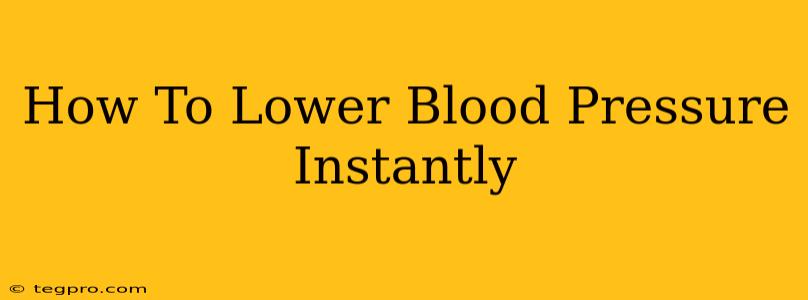High blood pressure, or hypertension, is a serious condition affecting millions. While medication is often necessary for long-term management, there are several things you can do to lower your blood pressure instantly. These techniques are best used in conjunction with a doctor-prescribed treatment plan, not as a replacement. Always consult your physician before making significant changes to your healthcare regimen.
Understanding the Urgency: When to Seek Immediate Medical Attention
Before diving into quick fixes, it's crucial to understand when a sudden blood pressure spike requires immediate medical attention. Symptoms like severe headache, dizziness, shortness of breath, nosebleeds, or chest pain warrant an immediate call to emergency services or your doctor. These could indicate a hypertensive crisis, a dangerous condition requiring immediate medical intervention.
Quick Ways to Lower Blood Pressure Immediately
These methods offer temporary relief and can help manage blood pressure fluctuations. Remember, these are short-term solutions and shouldn't replace ongoing medical management.
1. Relaxation Techniques:
- Deep Breathing: Slow, deep breaths can activate the parasympathetic nervous system, which helps lower your heart rate and blood pressure. Try inhaling deeply through your nose, holding for a few seconds, and exhaling slowly through your mouth. Repeat this several times.
- Meditation: Even a few minutes of meditation can significantly reduce stress and lower blood pressure. Focus on your breath, calming your mind and body. Guided meditation apps can be helpful for beginners.
- Progressive Muscle Relaxation: This technique involves systematically tensing and releasing different muscle groups to relieve tension and promote relaxation. Numerous resources are available online to guide you through this process.
2. Lifestyle Adjustments (Immediate Impact):
- Hydration: Dehydration can elevate blood pressure. Drink a glass of water immediately. Staying hydrated throughout the day is crucial for long-term blood pressure management.
- Change of Posture: If you've been sitting or standing for a long period, try changing positions. Standing up slowly can sometimes help.
- Avoid Caffeine and Alcohol: These stimulants can temporarily raise your blood pressure. If you're experiencing a spike, avoid these substances. Limit your intake of both in the long-term as well for optimal blood pressure control.
3. Dietary Considerations (Short-Term Effects):
- Reduce Sodium Intake: High sodium intake can increase blood pressure. While you can't drastically reduce sodium instantly, being mindful of your dietary choices is essential for long-term blood pressure control. Avoid processed foods, fast food, and salty snacks.
- Potassium-Rich Foods: Potassium helps balance sodium levels. While not an immediate solution, adding potassium-rich foods like bananas, sweet potatoes, or spinach to your diet can contribute to long-term blood pressure management.
Long-Term Strategies for Lowering Blood Pressure
While the above tips provide immediate relief, sustained blood pressure control requires long-term lifestyle changes:
- Regular Exercise: Engage in at least 30 minutes of moderate-intensity exercise most days of the week. This helps strengthen your heart and improve blood vessel function.
- Balanced Diet: A diet rich in fruits, vegetables, whole grains, and lean protein is essential for long-term health. Reduce your intake of saturated and trans fats, cholesterol, and sodium.
- Weight Management: Losing even a small amount of weight can significantly impact your blood pressure.
- Stress Management: Chronic stress can contribute to high blood pressure. Incorporate stress-reducing techniques into your daily routine, such as yoga, meditation, or spending time in nature.
- Quit Smoking: Smoking damages blood vessels and increases blood pressure. Quitting is one of the best things you can do for your overall health.
- Limit Alcohol Consumption: Excessive alcohol intake can raise blood pressure. Moderate consumption, if any, is recommended.

